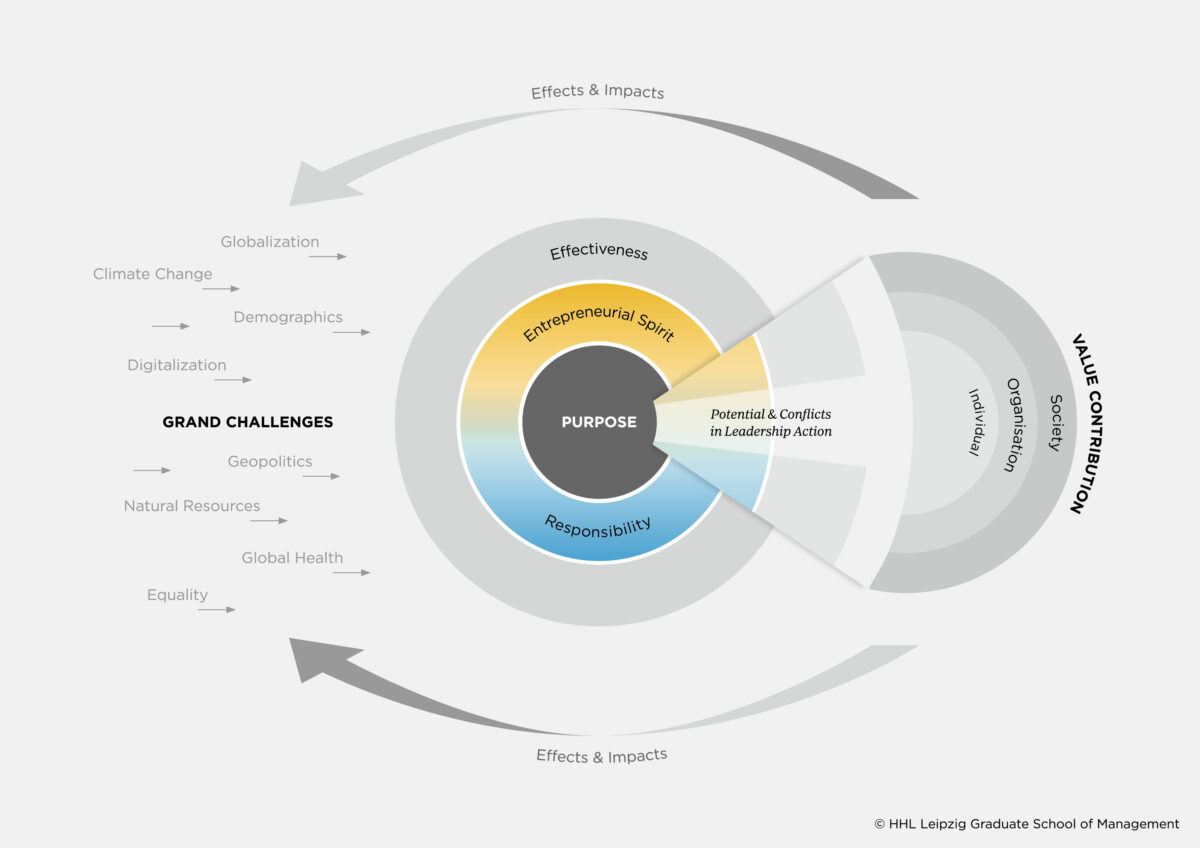THE LEIPZIG LEADERSHIP MODEL
Orientation for Leadership
What makes good leadership? What can I align myself with? Leadership issues of our time are above all questions of orientation: for society, for companies and for every manager themselves. The most important tool is your own personality. Good leadership through good inner work.
The Leipzig Leadership Model helps you to ask the right questions in complex situations. Orientation knowledge is emphasized as the basis for action. Good leadership is situation-specific. Instead of prescriptive knowledge, the ability to constantly reorient oneself and find pragmatic solutions based on values is required – we call it leadership orientation.

Timotar – Talk with a virtual Prof. Dr. Timo Meynhardt about the Leipzig Leadership Model
Do you have a quick question on the Leipzig Leadership Model or even want to get into deeper discussions?
Timotar, the chatbot of one of the Model’s initiators, is here to help – around the clock and in nearly 30 languages. It is based on his academic work and continuously learns. Discuss business psychology topics with it or event get coaching: Has shareholder value become obsolete? How can I strengthen my purpose-driven mindset? Can startups save the world?
Grand Challenges in Leadership Work
In leadership, we are increasingly confronted with sensitivity to contexts, possibilities and limits of mouldability and the dynamics of change. The Leipzig Leadership Model links operational leadership tasks with social problems and brings the Grand Challenges of our time into the focus of leadership work. Such grand challenges require joint efforts because they cannot be tackled by any one player alone. Solving problems requires cross-sectoral thinking and action.
In a world that is fundamentally unmanageable, it is important to achieve calculable effects and avoid unintended consequences. What are we doing to protect the global climate, manage demographic change or use artificial intelligence responsibly? Where are we overreaching ourselves? What is essential to do? Transformation processes in companies and organizations are thus seen as part of social (socio-ecological) transformation. As productive social systems, companies are not only market makers, but also social co-creators and thus social makers.
Basic Idea
The basic idea behind the Leipzig Leadership Model is that good leadership is measured by the extent to which it succeeds in linking its own business model with an overarching purpose, pursuing this purpose in an entrepreneurial, effective and responsible manner and thus making a value contribution to the greater good (common good) from which the contributors, the company and society itself benefit. In view of the major challenges facing the economy and society, this means recognizing the broader effects and impacts of entrepreneurial activity as part of management work.
Development History
Development History
The process of discussing a separate management model began immediately after the resumption of teaching at HHL Leipzig Graduate School of Management in 1996. Initially, particular attention was paid to the integration of leadership and management in order to strengthen a holistic understanding of the planning, design, implementation and control of business management processes. The criticism of the economistic orientation of many business schools, which intensified in the wake of the financial crisis from 2008 onwards, was seen as a challenge to formulate our own understanding of this holistic approach in a leadership model and thus to position ourselves clearly in the socio-political debate. To this end, an intensive theory-practice dialogue has been conducted since 2011. As a result, the first version of the model was published in book form in 2017. In 2022, an expanded model was presented to the public, which was developed in response to increasing crisis situations.

Dimensions for Leadership Issues
Four questions provide leadership orientation in complex decision-making situations:
- Are we pursuing an overriding goal? (Purpose)
- Do we think and act entrepreneurially? (Entrepreneurial spirit)
- Are our actions legitimate? (Responsibility)
- Are we effective? (Effectiveness)
The answers to these questions are often neither simple nor contradictory in everyday business life. A decision may make business sense but be socially irresponsible. In the Leipzig Leadership Model, the resulting conflicts of objectives are seen as a source of change and innovation.
Purpose
The purpose leadership orientation asks why and for what purpose a strategy, a product, a service or a specific work task is being pursued. It is not only about the goal, but also about the purpose of entrepreneurial activity – ultimately about the legitimization of a business model, an entire company and ultimately the basic market economy as a whole.
Entrepreneurial spirit
The entrepreneurial spirit leadership orientation examines the ability of people, organizations and society to renew themselves. It is about the ability to act, organize and innovate as the key to all development in startups, but also in established private and public companies.
Responsibility
The leadership orientation of responsibility asks about the boundary conditions in the pursuit of a purpose. It is about avoiding harm and the justified expectations of others. What is feasible and desirable is not always what is responsible. In other words: the end does not justify the means.
Effectiveness
The leadership orientation of effectiveness asks how a purpose can be realized. It is about the right professional approach and the means used to achieve a defined goal with scarce resources in a competitive environment. Effectiveness translates responsible and entrepreneurial decisions into targeted strategies, structures and processes.
You are currently viewing a placeholder content from YouTube. To access the actual content, click the button below. Please note that doing so will share data with third-party providers.
More InformationTeaching
What does ‘purpose’ actually mean? How do you recognize a good manager? Where do I stand myself? An examination of the Leipzig Leadership Model is an explicit part of the Welcome Weeks right at the beginning of the program at HHL. All students learn about the approach of the leadership model and relate it to other models of leadership research. In addition to imparting knowledge, critical reflection and creative appropriation are important. For this purpose, a special psychometric procedure has been developed in the form of the Leipzig Leadership Profile to determine the personal starting situation.
As the study programs progress, reference is then made to this in all courses, so that the Leipzig Leadership Model serves as a compass for repeatedly establishing the everyday connection to concrete leadership work in different areas of knowledge. This also requires lecturers to constantly emphasize the relevance of scientific knowledge for dealing with complex leadership situations. The overall aim of this reorientation of teaching is to make the Leipzig Leadership Model an integral part of the discussion on ‘good leadership’ at HHL.
Seminar on the Leipzig Leadership Model
What does ‘purpose’ actually mean? How do you recognize a good manager? Where do I stand myself? An examination of the Leipzig Leadership Model is an explicit part of the Welcome Weeks right at the beginning of the program at HHL. All students learn about the approach of the leadership model and relate it to other models of leadership research. In addition to imparting knowledge, critical reflection and creative appropriation are important. For this purpose, a special psychometric procedure has been developed in the form of the Leipzig Leadership Profile to determine the personal starting situation.
As the study programs progress, reference is then made to this in all courses, so that the Leipzig Leadership Model serves as a compass for repeatedly establishing the everyday connection to concrete leadership work in different areas of knowledge. This also requires lecturers to constantly emphasize the relevance of scientific knowledge for dealing with complex leadership situations. The overall aim of this reorientation of teaching is to make the Leipzig Leadership Model an integral part of the discussion on ‘good leadership’ at HHL.
(Philipp Radomski, Tim Rauch, Lukas Rohsiepe, Maximilian Rudolph, Daniel Kanaan)
(Thanh Nguyen, Luis Schaal, Frederick Schiffmann, Benedikt Tostmann)

Publications
The Leipzig Leadership Model was comprehensively presented in a monograph, ‘The Leipzig Leadership Model’, by the HHL authors. The third edition (in German) was published in 2019. The second edition (2017) was published in German and in English.
In October 2022, the core team of the Leipzig Leadership Model compiled a new anthology: ‘Führen in der Krise: Herausforderungen an das Leipziger Führungsmodell’ (Leadership in a crisis: Challenges to the Leipzig Leadership Model). Using the COVID-19 crisis as an example, HHL professors reflect on what this means for their field and make recommendations. The common frame of reference is the Leipzig Leadership Model with the fields of purpose, entrepreneurship, responsibility and effectiveness. As a result, they argue in favor of focusing (more) specifically on the major challenges of our time (Grand Challenges) as well as the effects and impacts of entrepreneurial activity in the social environment. In short: good leadership in a crisis means helping to overcome grand challenges. The list is long: climate crisis, geopolitics, equality…
Monograph ‘The Leipzig Leadership Model’, 3rd edition (2019)
Kirchgeorg, Manfred; Meynhardt, Timo; Pinkwart, Andreas; Suchanek, Andreas; Zülch, Henning:
The Leipzig Leadership Model: leading and contributing
3rd, improved edition. Leipzig: HHL gGmbH, HHL Academic Press, 2019.
ISBN 978-3-9818509-5-6
ISBN 978-3-9818509-6-3 (EPUB)
The title is available in bookshops: Paperback: EUR 22.90 / e-book: EUR 14.99, e.g. as Kindle Edition, in epub format on ebook.de
English edition (2nd edition 2017)
Kirchgeorg, Manfred; Meynhardt, Timo; Pinkwart, Andreas; Suchanek, Andreas; Zülch, Henning:
Das Leipziger Führungsmodell: the Leipzig Leadership Model
2nd revised and expanded edition. Leipzig: HHL gGmbH, HHL Academic Press, 2017.
ISBN 978-3-9818509-2-5
ISBN 978-3-9818509-3-2 (EPUB)
The 2nd edition of the Leipzig Leadership Model was published in two languages (English/German). This edition can also still be purchased in bookshops:
Paperback EUR 34.90 / as an e-book, e.g. as a Kindle Edition, or in epub format on ebook.de for EUR 19.99.
Anthology ‘Leadership in the crisis’ (2022)
Meynhardt, Timo; Kirchgeorg, Manfred; Pinkwart, Andreas; Suchanek, Andreas; Zuelch, Henning (Eds.)
Leadership in the Crisis: Challenges for the Leipzig Leadership Model
Leipzig: HHL gemeinnützige GmbH, HHL Academic Press, 2022. 181 pp.
ISBN 978-3-9818509-8-7
ISBN 978-3-9818509-9-4 (EPUB)
The title is available in bookshops: Paperback: EUR 24.90 / e-book: EUR 14.99, e.g. as Kindle Edition, in epub format on ebook.de
